INVISALIGN—COLUMBUS, OH
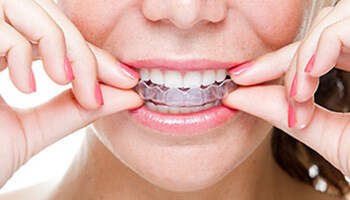
Many adults would like to straighten their teeth, but the idea of wearing noticeable metal braces scares them. Thankfully, we offer Invisalign, which is a much more aesthetically focused treatment option for patients than braces. Rather than brackets and wires, Invisalign utilizes a series of clear plastic aligners to gradually straighten the teeth. This technology is continuing to develop and improve, making it a viable option for the majority of adults and adolescents.
HOW DOES INVISALIGN WORK?
For Invisalign, you will be given a series of custom-made aligners. These aligners will fit onto your teeth using tooth-colored attachments (buttons) that are glued directly onto enamel. Each aligner will be shaped slightly different to make small adjustments to the position of your teeth. The entire process will be mapped out by Dr. Mason beforehand. After wearing a set of aligners (one for your top and bottom teeth) for about one to two weeks, you will then progress onto the next. Once you have gone through the entire series, your treatment will be complete.
Invisalign Summit 2016 Semi-Finalist Cases
Case 1
Adult female, front and back crossbite, crowded arches, and worn dentition.
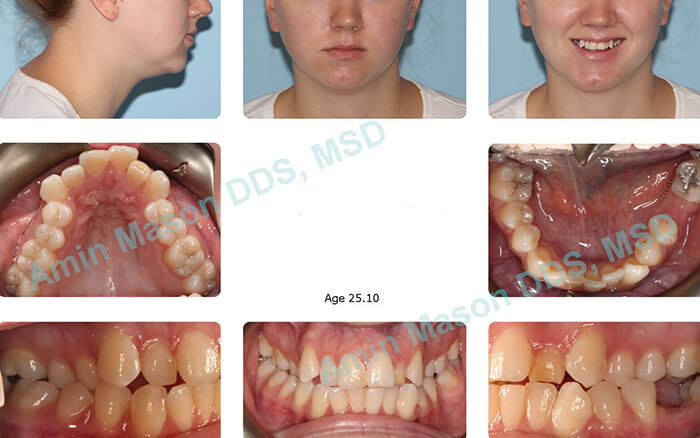
Treatment: Patient was treated with Invisalign clear aligners only.
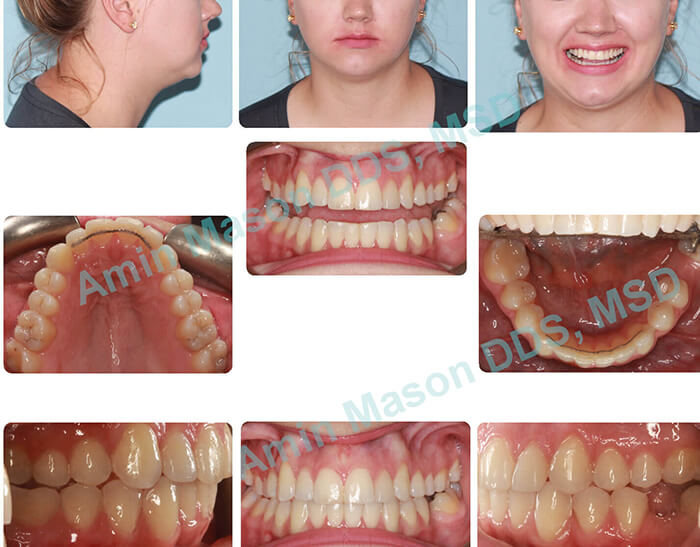
Case 2
Adult female, unilateral posterior crossbite, crowded upper arch, and class II molar relation on the right with a narrow smile on the right side.
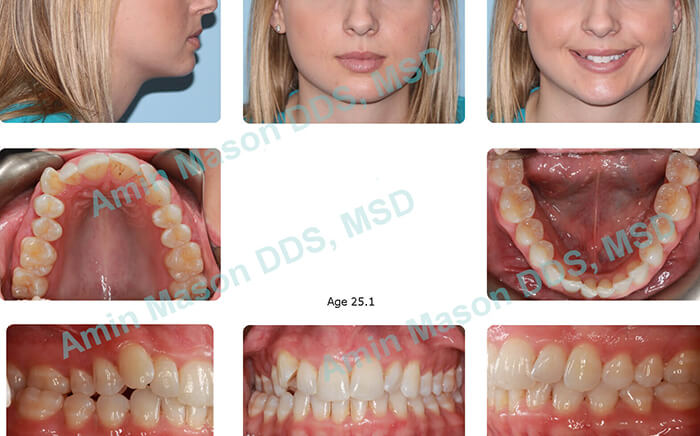
Treatment: Patient was treated with an expander followed by Invisalign.
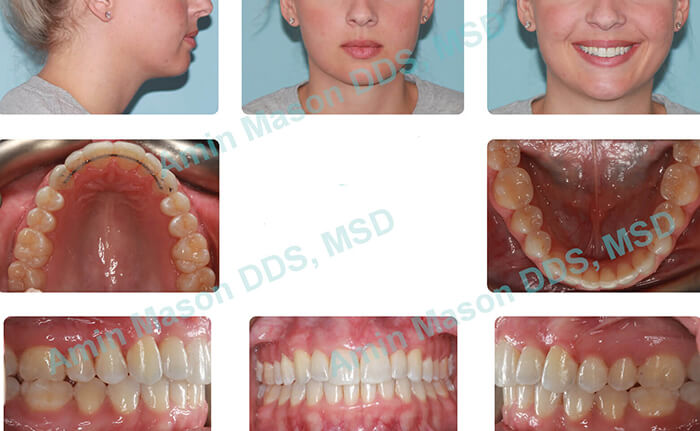
WHAT CAN INVISALIGN FIX?
Invisalign can be used to reliably correct the most common orthodontic issues, such as:
CROWDED TEETH
When the teeth are too close together, it can cause them to be crooked--negatively affecting the appearance of the smile-- and make them much more difficult to clean. By removing any crowding, Invisalign can improve how someone looks and also lower their long-term risk for tooth decay and gum disease.
ROTATED TEETH
Teeth can erupt from the gum line at an incorrect angle for a multitude of reasons (mostly crowding), creating both cosmetic and functional problems for a patient. Dr. Mason can use Invisalign to properly align the teeth and put them on the right axis.
SPACING
Large, visible spaces in the teeth can be unattractive and make it harder for a patient to speak and eat properly. Invisalign is very effective at closing excess gaps to create a healthier and more confident smile
OPEN BITE
If a patient’s front teeth are slanted too far forward, this can prevent the upper and lower teeth from coming together properly to form the bite. Invisalign can be used to fix this problem, which can help the teeth aesthetically and even remove stress from the jaw joint that might be causing chronic pain.
CROSSBITE
Normally, the upper teeth are supposed to sit outside of the lower teeth when the mouth is closed, but with a crossbite, the upper teeth actually bite down inside the lower teeth. This can occur at the back of the mouth (a posterior crossbite) or the front (an anterior cross bite). Crossbites often lead to chronic jaw pain and cause the teeth to rub against each other and wear down quicker than normal, but fortunately, Invisalign can be used to correct this.
UNDERBITE
An underbite is when the lower front teeth extend out beyond the upper teeth, which can cause aesthetic issues as well as create problems with speech and chewing. Invisalign can be used to help the teeth line up properly to achieve a healthy bite and beautiful smile.
INCREASED OVERBITE/DEEP BITE
If the upper front teeth stick out too far in front of the lower teeth, this is called an overbite. This makes the upper teeth much more likely to be injured, plus it can cause someone to feel very self-conscious about their smile. Over the years, Dr. Mason has used Invisalign to correct countless overbites and make them virtually disappear.
HOW SUCCESSFUL IS INVISALIGN?
The success of an Invisalign treatment will be determined by a clinician’s training and the patient’s compliance with their prescribed treatment plan. Dr. Amin Mason has actually completed a university orthodontic residency which enables him to treat both simple and complex orthodontic issues with Invisalign. In fact, he is actually an Invisalign Premier Provider and has helped hundreds of patients revitalize their smiles with this treatment.
In 2016, he was a semi-finalist in the North American Invisalign Summit. This summit seeks to recognize orthodontists from all across the country who have achieved successful clinical outcomes using Invisalign. Hundreds of cases are submitted to the summit each year, and out of them, two of Dr. Mason’s patients were chosen by fellow orthodontists to be featured as semi-finalists.
HOW DOES INVISALIGN COMPARE TO BRACES?
- Invisalign is much less noticeable on the teeth, making them perfect for social events such as dances, weddings, and graduations.
- Invisalign is removable, meaning a patient will be able to brush their teeth like normal during treatment, making it easier to maintain their oral health.
- Invisalign’s smooth plastic aligners are much more comfortable than braces.
- Invisalign patients never have to worry about common orthodontic emergencies such as broken brackets or poking wires.
- Unlike with metal braces, people with Invisalign do not have to avoid certain foods.
- Invisalign requires a patient to have fewer progress visits during treatment.
WHAT ARE INVISALIGN TREATMENT REQUIREMENTS?
In order to work properly, a patient must wear their Invisalign aligners for at least 22 hours a day. The aligners must be taken out before eating or drinking anything except water. If you would like to see if Invisalign would be right for you, please contact our office today for a consultation.
WHAT TO EXPECT WITH INVISALIGN
Your treatment will begin with a consultation, wherein Dr. Mason will determine whether you are a good candidate for Invisalign treatment. Then, he will work with an Invisalign laboratory to design a customized plan for moving your teeth into their proper places. After you begin wearing your Invisalign aligners, you will need to visit us periodically for quick checkup appointments. Once you have worked your way through all of your aligners, it will be necessary for you to wear retainers to prevent your teeth from drifting back out of place.
Understanding the Cost of Invisalign

The cost of Invisalign varies from patient to patient. When you visit Dr. Mason for your consultation, he will evaluate your case before our team can give you a price estimate for your treatment. We will also assist you as you consider your payment options, such as insurance and financing.
Factors that Affect the Cost of Invisalign
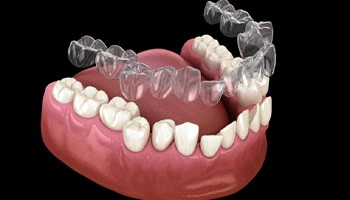
The biggest factor that affects the price of Invisalign is the extent of a patient’s dental misalignment. The farther your teeth have to move, the more aligners you will require. You will also need a higher total number of appointments with our practice, and you might need special accessories to make your treatment a success. Such things can contribute to higher overall costs.
Another thing that can affect your cost is your compliance with treatment guidelines. Failing to wear your aligners as much as recommended, or making other missteps with Invisalign, can delay your final results and might ultimately lead to extra fees.
Invisalign vs. Mail-Order Clear Aligners: Which Is the Better Value?
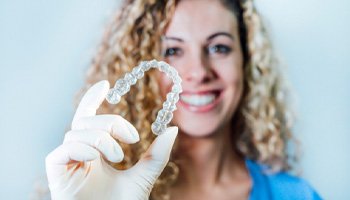
In recent years, mail-order clear aligner systems have seen a boom in popularity. These products may cost around $2,000 for start-to-finish treatment. That can make them seem appealing, especially since Invisalign typically costs significantly more than that. Before you make any decisions about which treatment to use, however, you should consider what you are getting for your money.
With Invisalign, you get the best of everything. You get the in-person support of an experienced orthodontist. Your aligners will be made out of a special, patented form of plastic, and state-of-the-art technology will help to make your treatment a success.
With mail-order systems, your aligners may be made out of basic plastic. Plus, it might be difficult to get the support you need if you ever run into any problems with your treatment. Many patients have been dissatisfied with the results they get from mail-order clear aligners.
Does Dental Insurance Cover Invisalign?

Dental insurance plans vary in how they handle orthodontia. Some premium plans provide 50% coverage for braces and Invisalign, up to the amount of the plan’s predetermined lifetime orthodontic maximum. If your policy applies, it might reduce your out of pocket costs by hundreds of dollars or more.
If your insurance will not cover your Invisalign, you might be able to use your healthcare savings account or flexible spending account to pay for a portion of your treatment.
Options for Making Invisalign Affordable

In addition to assisting you with your insurance claims, our team can help you apply for financing. We are partnered with CareCredit, a third-party lender that offers low- and no-interest payment plans for dental and medical treatment. Most patients qualify for credit. You may even be able to choose from between several different monthly payment amounts, according to what works best with your family’s budget.
Are you ready to achieve straighter, healthier teeth with the help of Invisalign and the Columbus Orthodontic Center team? Get in touch with us today to ask questions or request a consultation. We look forward to taking great care of your smile!
INVISALIGN FAQS
Still have questions about Invisalign after reading this page? You’re not alone, which is why we’ve answered some of our most popular FAQs down below. After looking over them, if there is anything else you’d like to ask, don’t hesitate to get in touch with our team—we’re always happy to provide any information you need!
HOW LONG DOES INVISALIGN TREATMENT TAKE?
This really depends on the degree of misalignment of your teeth. Minor cases may take less than a year to fix, while more complicated ones will require a longer process. On average, the treatment time for Invisalign is about 12-18 months, but Dr. Mason can give you a much more definitive timeline when you come to see him for a consultation.
DOES INVISALIGN TREATMENT HURT?
Overall, Invisalign treatment tends to be more comfortable compared to braces because the aligners are made of smooth plastic and custom-shaped for each patient. However, it is still an orthodontic treatment, so after you get a new aligner, you will likely experience a little pressure and tenderness. This simply means that Invisalign is working, and fortunately, these symptoms tend to go away after a few days. An OTC medicine can help provide immediate relief if needed.
HOW MUCH DOES INVISALIGN COST?
The cost of Invisalign can vary from patient to patient depending on how many aligners they need and the time it will take to complete the treatment. Some patients only need about a dozen trays, while others require many more. When you come to see Dr. Mason for a consultation, he will be able to discuss your treatment and the length of time it will take you to complete it. His dedicated team will discuss the financials and review the pricing so you’ll know exactly what to expect.
CAN I USE MY DENTAL INSURANCE TO PAY FOR INVISALIGN?
Most dental insurance plans pay a specific amount towards orthodontic treatment. Be sure to go over your plan and talk to our team to better understand your benefits. If your insurance does not offer any benefits, you can get flexible, low-to-no interest financing through CareCredit and LendingPoint, which you can learn more about by clicking here.

